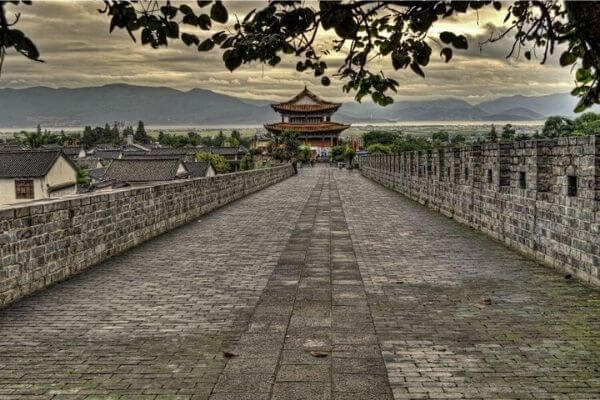
China's judiciary comprises of courts, procuratorates, supervisory commissions, and two other governmental organs—public security organs (i.e. Ministry of Public Security and local public security bureaus) and judicial administrative organs (i.e. the Ministry of Justice and local justice bureaus).
I. Brief introduction: “horizontal blocks”(塊狀) and “vertical lines”(條狀)
The legislative body, the people's congress, establishes judicial organs at the same level, which means that it elects or appoints the heads of such judicial organs. All these judicial organs are responsible for the people's congress at the same level and subject to its supervision. Therefore, the local regime of each region is like a “horizontal block” composed of the people 's congress and the judicial organs at the same level.[1]
Meanwhile, to some extent, the judicial organs are subject to the guidance or leadership of the judicial organs at a higher level. Therefore, the judicial hierarchy ranging from the judicial organs at the lowest level to the one at the highest level is like a “vertical line” with the ascending order of the powers of guidance or leadership.
Each local judicial organ is not only influenced horizontally within the “block” by the local authorities at the same level, but is also influenced vertically within the “line” by the judicial organs at higher levels. The judicial organ making decisions in a specific period or on a specific matter is usually subject to the influence of the horizontal block or/and the vertical line at that time.[2]
Please refer to the structure chart of central and local judicial organs for reference.

For more information about China's election, please read “How Do Elections in China Work”.
II. Functions and powers of the judicial organs
1. Courts: to try cases and handle cases of extradition and judicial assistance.
2. Procuratorates: to review and approve applications of arrests; to initiate public prosecutions; to initiate public interest litigation; to investigate specific kinds of crimes; and to supervise courts, public security organs, detention centers, and prisons.
3. Supervisory commissions: to investigate suspected duty-related illegal acts of public servants and impose administrative sanctions on them; to investigate suspected duty-related crimes of public servants and transfer them to procuratorates for public prosecution.
4. The public security organs: to investigate crimes (except crimes investigated specifically by the supervisory commissions, the procuratorates, and the state security departments) and to transfer the case to the procuratorate for public prosecution where necessary; to take compulsory measures, such as detention, to the criminal suspect; to impose public security administrative sanctions on the offender for his/her act, which disturbs the social order but is not sufficient to constitute a crime.
5. The judicial administrative organs: to administer lawyers, legal assistance, forensic examination, polarization, and arbitration, to organize the national unified legal professional qualification examination, to regulate prisons and drug addiction treatment centers; and to handle the cases of administrative review and administrative litigation related to the governments at the same level.
In addition, the judicial organ under the central government, namely the Ministry of Justice, also exercises the following functions and powers: to formulate legislative programs; to draft laws and administrative regulations; to put on file rules and local regulations; and to represent China in international judicial cooperation or cooperation in other legal fields.
III. The relationship between the judicial organ and the people’s congress at the same level
China's authorities are divided into five levels ranging from the central government to the local governments, namely: the central government, the governments at provincial, municipal, county(district) and township levels.
The government at each level has its people's congress, but the judicial organs are only established at the central, provincial, municipal and county(district) levels. Each judicial organ is subject to the supervision of the people 's congress at the same level.
Through election, the people's congress appoints the leadership of the judicial organs at the same level, namely: the presidents of courts, the procurator-general of procuratorates, directors of supervisory commissions and heads of governments (such as premiers, governors, mayors and county heads) at the same level.
The head of the government, nevertheless, is entitled to directly appoint the heads of the public security organ and judicial administrative organ at the same level.
IV. Relationship between judicial organs at different levels
1. Courts: The Supreme People's Court supervises the trials heard by local people's courts at various levels and the specialized people's courts; people's courts at a higher level supervise the trials heard by the lower people's courts. For example, in the proceedings of second-instance trial or retrial, a court at a higher level may remand the case to the lower court for retrial, or reverse, revoke, or alter the previous judgment.
For more information about China's court system and the internal structure of Chinese courts, please read “What is the Court System Like in China - China Legal Research Guide”.
2. Procuratorates: The Supreme People's Procuratorate shall lead the local procuratorates at various levels and the specialized procuratorates; procuratorates at higher levels shall lead those at lower levels. For example, if the procuratorate at a higher level deems that the decision of the lower procuratorate is inaccurate, it may order the lower procuratorate to correct its decision, or revoke or alter its decision.
3. Supervisory commissions: The National Supervisory Commission shall lead and guide the work of local supervisory commissions at all levels, and the supervisory commission at a higher level shall lead the work of the lower supervisory commission.
4. Public security organs: The Ministry of Public Security shall lead and direct the public security organs throughout the country. The public security organs at a higher level shall supervise the law-enforcement activities of those at a lower level, and shall revoke or alter the sanction or decision if they find any mistake therein.
5. The judicial administrative organs: The judicial administrative organs at a lower level shall be subject to the professional guidance of the judicial administrative organs at a higher level and shall implement the rules and decisions promulgated by them. However, the judicial administrative organ at a higher level usually has no power to revoke or alter the decisions of the lower judicial administrative organ.
For more information about China's legal system, please read “What's Chinese Legal System”.
You may also be interested in articles in the following tags:
References:
[1] 馬力宏.論政府管理中的條塊關系[J].政治學研究,1998(04):71-77.
[2] 劉忠.條條與塊塊關系下的法院院長產生[J].環球法律評論,2012,34(01):107-125.
Cover Photo by James Wheeler (https://unsplash.com/@souvenirpixels) on Unsplash.
Contributors: Guodong Du 杜國棟







